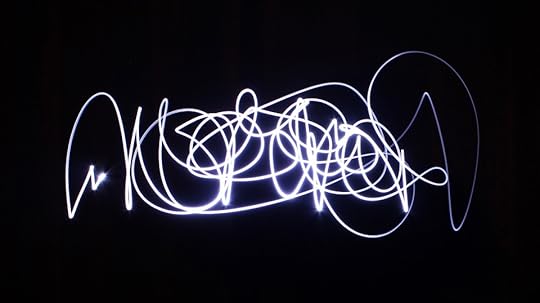Alan Watt's Blog, page 13
May 24, 2017
The Purpose of the Outline

Whether consciously or not, every writer is in search of a process.
The outline is an often misunderstood element in the creative process. Some novelists eschew it completely, considering it to limit their imagination, while others set out to plot their stories so completely there will be no surprises along the way.
As I see it, the purpose of the outline is to help the writer see beyond his fixed idea to a more dynamic version, before losing himself in the world of the story.
The other reason is that it could be helpful to develop a sense of a beginning, middle, and ending, before beginning the first draft, as it often frees him from unnecessary anxiety.
With a basic confidence in the story, this can paradoxically allow the novelist or non-fiction writer to pursue a narrative with abandon, allowing the story to have a sense of surprise.
Let me know your thoughts.
May 22, 2017
Keeping the Rewrite Alive

Hi Writers,
A director told me once that if you put two actors together in a scene without directing them or staging the scene, that as the scene played out, the conflict would likely begin to diminish, that if the actors were on opposite sides of the stage, they would likely gradually drift toward each other, and that their voices would begin to match each other in tone and volume.
It is human nature to want to resolve conflict. We do not like the discomfort of not getting along with others. Human beings are pack animals, and the primal urge to belong should never be underestimated. This is why the role of the writer is courageous, because our job demands that we observe and offer our (sometimes contrarian) dispatches from the fringe. The first time Ibsen’s A Doll’s House was staged, the audience sat in dumbstruck silence at the final curtain. They could not conceive of a story that ended with a woman walking out on her husband. It was just not done!
The future is predicted most accurately, not by scientists, but by artists. (Actually I just made that up. I have no idea who predicts the future most accurately. It could be a consortium of dentists in Miami.) The point I want to make is that there can be a tendency in the rewrite to tame the wildness of our first draft, to make sense of it, to neuter it, to make it something that we hope people will understand, to make it palatable, accessible. In short, to kill it.
We don’t want to do this. We want, above all, to preserve the poetry of that initial draft.
As humans, we are geared to evolve, to find order in chaos. The seasoned writer understands that his job is to not only maintain the tension, but to allow it to build through complication. The tendency in the rewrite can be to not want to put our hero in hot water. We want to put our hero in some conflict, but not enough that we can’t control it. Our fear is that if we do this, our story might collapse, and after all the work we have put in already, after this great investment, we think that we cannot afford for this to happen. This fear may arise frequently for us in the rewrite, but if our initial premise is sound, we need not be concerned. Our only job in the rewrite is to hold the story loosely and continue to inquire.
When fear arises, it is natural that we want to try and solve the story problem as quickly as possible. Remember what Einstein said: “You can’t solve a problem with the same thinking that created the problem.” If we “solve” this problem with our brain, there will never be a transformation. Simply put, most story solutions are simple, but they are rarely linear. The key in solving the problem is to maintain the tension.
Our hero wants the tension to be resolved, and sometimes, what can happen is that the hero and the author’s fear can meet in the back room and strike a deal behind the author’s back. We must be willing to follow through to the end with what it is that our hero wants.
Our stories are far more flexible than we may sometimes think. When we are willing to explore the vast reaches of our character’s experience, and allow our idea of the story to fall apart, only then is it possible for our story to truly live in all its specificity. After all, we only think our stories are written for others to read. At core, they are nothing more than a document of our growth. We write them for ourselves.
Let me know your thoughts.
The 4-Day Outline Your Story
starts May 23rd, 2017
May 17, 2017
Trusting the Unconscious

If you’re a first-time novelist, and you’ve yet to complete a manuscript, you may have had the experience of writing something, and getting stuck halfway through.
Our idea of our story is rarely the whole story. It’s not that our idea is incorrect, it’s that it is incomplete. The challenge for the first-time novelist is to loosen his grip on his idea in order to trust his unconscious to lead him to the deeper truth in the story.
When we trust our impulses, and allow our story to emerge, in spite of the fears that we are doing it all wrong, our story has a chance to live, and we move closer to becoming published first-time novelists.
Let me know your thoughts.
Classes are filling up!
Don’t forget to register.
The 4-Day Outline Your Story
starts May 23rd, 2017
May 15, 2017
Writing the Forbidden

It is challenging sometimes for me to let go of my “idea” of my story, in order to allow the actual story to emerge. Let’s remember that we never need to impose anything, but rather inquire into the nature of our character’s fundamental dilemma.
In the Coen Bros. darkly comic film, Burn After Reading, the fundamental dilemma seems to have something to do with vanity. We might characterize the dilemma as “how can I be content, when I don’t think I am enough?” This is a dilemma, because if I am content, I may believe that I will become complacent, and I cannot afford to be complacent, because I don’t think I am enough, therefore I will never get what I want, e.g., love, money, a plastic surgery operation, etc. It is a setup, a circular problem that can never be resolved. We can see how this question arises over and over again in the film. As viewers, we experience the dilemma as a feeling tone. It’s visceral, never intellectual. We are completely invested in the experience, along with the characters. (Spoiler alert for next sentence) Did anyone not recoil (along with George Clooney) when Brad Pitt was shot in his closet? We experience the film viscerally.
In creating our stories, there can, at times, be a tendency to want to play it safe, to control our story in some way. As I’ve said before, the desire to write is connected to the desire to resolve something within ourselves. By that I mean, we are always writing our story to some degree, or at least investigating into the nature of something that compels us. Therefore, we are going to be touching that tender spot in ourselves.
Rather than getting all warm and fuzzy, and saying that we need to be gentle with ourselves (which, of course we do), I want to suggest an image. Let’s think about being the “wise man or woman on the hill,” which is what our unconscious is. Our unconscious understands with absolute clarity that life is not about good and bad, winning and losing, and the dispensing of blame. Our unconscious understands that the nature of existence is predicated on cause and effect.
What I am getting at, is that if I am always, to some degree, writing my own story, it is absolutely imperative that I maintain a “professional distance” from my story, while at the same time allowing myself to be a channel for the images that want to be told through me.
In simple terms, I need to get my ego out of the way. I need to cut myself some slack, and then, I need to be willing to go to that raw place. Let me allow myself to get a little embarrassed by what I’m writing. (By the way, I always give myself permission to not show my work to anyone – I also don’t tell people what I am working on. I never discuss my story with people, including my agent or my wife, and certainly never in any specific way). My story is sacred, and I treat it as such.
If I give myself permission to be dangerous on the page, to expose myself, people are going to connect. This is the great irony of the creative process. The more personal (meaning specific, not self-consciously confessional) my story is, the more people will relate. We will all understand. Hell, more than understand, we will care, we will be invested, and we will be on the edge of our seats wanting to see how this story resolves itself.
Let us give ourselves permission to write the forbidden. We may feel that we are exposing our deepest secrets, but guess what, (and this may or may not surprise you). Nobody cares! All people care about is our story.
Let’s ask ourselves. Did we wonder, for even a second, if the Coen brothers were the vainest people in America, because they had written a movie about vanity? Did we wonder if they had ever secretly taken a hatchet to someone’s head, as Malkovich did to Richard Jenkins? Did we wonder if perhaps they were secretly saving up to buy butt implants? I sure didn’t. I’m really not wondering these things. And here’s why . . .
Terence, the 100 B.C. Roman playwright and philosopher said, “Nothing human is alien to me.”
. . . because vanity lives in all of us, as does the murderous impulse, as does anything that we can possibly imagine.
When I am willing to write from the most personal aspect of my characters, I instantly connect with their universality. It is the irony of art, that in exposing my supposed weakness, my puny-hearted pettiness, for example, I commit a most large-hearted act.
Let me know your thoughts.
Classes are filling up!
Don’t forget to register.
The 90-Day Screenplay
starts May 17th, 2017
The 4-Day Outline Your Story
starts May 23rd, 2017
May 9, 2017
Writers, The Internet is Not Your Friend

Not only is the Internet a storehouse of information, an encyclopedia at your fingertips, it is also a time-sucking vortex bent on destroying your creative life.
If you want to have a flourishing creative life, you must conquer this addiction.
Don’t convince yourself that you’re just going to check your email, spend a minute on Facebook, or watch a kitten open a door on Youtube.
You’re not.
You’re postponing the sense of satisfaction and accomplishment that comes from completing your first novel.
If you are truly addicted, which we all are, get the app, FREEDOM, which blocks your Internet access for the period of time you set aside to write.
Let me know your thoughts.
Classes are filling up!
Don’t forget to register.
The 90-Day Screenplay
starts May 17th, 2017
May 8, 2017
No Good Guys. No Bad Guys.

Why do some stories have an ineffable “alive” quality, while others do not?
There are times that we can be so bull-headed about what we want to express that we end up pushing an agenda rather than telling a story. We create good guys and bad guys, and in so doing, our writing becomes general, turgid, boring. This may seem obvious, but at times it can be subtle.
I believe my challenge in “writing the truth” is accepting that I never know the whole story, that I am simply a channel for the story that wants to be told through me.
When we create good guys and bad guys, we have taken a position, which is not our job. Story is not about making moral judgments, though some will tell you it is. It is about cause and effect, action and consequence.
This means that on some level we must always be willing to let our story collapse in order for our characters to live. This is where storytelling becomes an act of faith, because we are often writing against the direction we think our story is heading. For example, if I’m writing a romantic comedy about a boy who meets a girl, loses her, then gets her back, I need to be watchful that when he loses her, he has genuinely lost her in some real and fundamental way. It is not enough for the couple to simply have a disagreement or misunderstanding, and then later, reunite. I want to thoroughly investigate his experience of losing her. It is only in the losing that he can experience a surrender of his old identity, thereby creating a space for him to have a shift in perception (a new understanding of the nature of things).
The truth is far more complex than our idea of the story. It is in the nuance, the specificity, that the story gets juicy. The more willing we are to recognize that our hero and antagonist both want the same thing, the more human they become. Often, the only thing separating our hero from our antagonist is that our hero is willing to surrender his old identity.
The tendency to push an agenda exists to the extent that we are unwilling to surrender. When we are a channel, meaning when we are willing to tap into something universal, we come into contact with our “basic goodness.” Now, perhaps this is just me forcing my own agenda, but I believe that mankind’s resting state is love, that conflict is born out of fear. I believe it is our challenge in every story to define love. I mean this in terms of approaching life from a spirit of evolution. Love is the ultimate object of subjectivity, it has a million different meanings. It is the ultimate mystery, and lies at the heart of every story. When we relegate characters to certain camps, we deny that mystery. In fact, we play God, not allowing for the truth of the world to unfold for us.
Great storytelling gives us a glimpse into the true nature of things. At the heart of all great writing is a surrendered quality, an acceptance of the way things are, as if the writer had lost touch with the civilized world and was taking dictation from another plane. Great writing transcends knowledge. It enters the realm of the imagination, where we risk all that we know, so that a new order can be born.
Let me know your thoughts.
Classes are filling up!
Don’t forget to register.
The 90-Day Screenplay
Starts May 17th, 2017
May 3, 2017
Did I Write Today?

This is the only question you need to ask yourself at the end of the day.
Nothing else matters, not the dishes, the oil change, or returning your buddy’s call to go see the new Transformers movie.
Only after the writing is done do those things matter.
Finish your work for the day. Yes, the writing is lousy in places and the story doesn’t always make sense.
Who cares? You wrote today.
Let me know your thoughts.
Classes are filling up!
Don’t forget to register.
The 90-Day Screenplay
May 2, 2017
Is It Good?

There can be a real desire, especially for the novice writer, to have someone validate our work as soon as possible, even to tell us if we are, in fact, a writer. It’s a lot of power to assign to someone else.
I have a friend, a successful Century City lawyer, let’s call him Arthur. In the ’70’s Arthur was not only a successful young attorney, but also an up and coming novelist. Time Magazine named him one of the ten brightest new stars in fiction. He had published three novels in fairly quick succession to some acclaim.
On an international flight he scribbled down twenty pages of what he hoped to be the beginning of his fourth novel. He got home, thrilled at what he had written and showed it to his wife. Her response was lukewarm, not positive. (To be honest, I can’t remember exactly what her response was, because I only remember his.
He never wrote again.
The world is littered with the towering potential of unfinished manuscripts. We’re all fragile and insecure, and sometimes we objectify the act of creation, meaning we believe that some are born artists while most of us are just kidding ourselves. We wonder which camp we fall into, and fear we are the fools, wasting our lives in a pointless endeavor.
There comes a time when we must stop measuring our passion and surrender to our purpose. When we direct our focus to simply telling the story, great things can start to happen.
Before sending our work into the world we should be able to answer two questions for ourselves.
Have I said what I wanted to say?
Have I done it in the most effective way?
When you have satisfied these two criteria, then you can send it out for constructive criticism, and it is time to move on. Next.
Something powerful happens when we have answered these two questions. We become ready for criticism. We have come to understand what we have written, and are no longer in that vulnerable daydream state. We have been ruthless with our pen. We have developed objectivity and are now seeking solutions to make the work better.
I don’t think my friend Arthur ever decided to quit writing. I don’t think it works like that. Perhaps he began to doubt his story. Perhaps this doubt led to distraction. (I happen to know it did – last year we spoke briefly and he told me that he had recently split from his fifth wife). And finally, not writing became the norm.
Is it good? Good is relative. Have I said what I wanted to say? Have I done it in the most effective way?
Next.
Let me know your thoughts.
Classes are filling up!
Don’t forget to register.
The 90-Day Screenplay
April 28, 2017
The Rewrite

In a thrilling display of solidarity, the 90-Day Novelists finished their first drafts a couple of weeks ago and have begun their rewrites. The first draft was about diving into the unknown, invoking the muse, and writing from our right brains. This next step, the rewrite, is about switching gears. Basically, it is about becoming still, listening more deeply so that we can get even more specific. What follows are some thoughts that I hope may shed some light for any of you currently engaged in the rewrite process.
Writing a story is a setup. We are asking ourselves to solve a problem that is impossible to solve. At least in our minds. You’ve probably noticed if you go to a lot of movies or read a lot of books that at some point in the story, the hero experiences despair, a dark night of the soul. This is a rite of passage. Because it is through the dark night of the soul that we are introduced to our true nature. Nature is beautiful, but it is also brutal, insofar as we are confronted with the stark fact that we have no say in the matter. Nature trumps everything. We are all going to die, whether we like it or not.
Many first-time novelists write their coming-of-age story. I think about this term, and I realize that it doesn’t mean becoming a man or woman in the traditional sense. It means becoming the age that we are. The dark night of the soul in a coming-of-age story is the death of our youth, or our childish expectation of how things ought to be. It is crucial for the writer to make the shift from the personal to the universal and become more interested in the “nature” of the problem, than what he “perceives” the problem to be.
Waking up is not necessarily a pleasant experience. When we wake up, we are confronted by a world that does not operate the way we would wish. It is at this moment that we are presented with a choice. We can rail against the injustices done to us, stomp our feet and retreat into the endless myriad of survival strategies that sustained us in Act 2—force of will, manipulation, pleading and bargaining, hoping against hope—or we can make a new choice.
We can allow our hearts to break. We can be truly brave. We can live with our true nature and accept this world as it is. And it is from this perspective, when we are more interested in our nature than in our problems that we are able to see the problem for what it really is: an opportunity for our hearts to open, an opportunity for us to reframe what we thought the problem was, an opportunity to perhaps even have a sense of humor about the reality of our situation. It is through this experience of our hearts opening that we are transformed. And it is through this transformation that our world is altered and what we had once hoped for but had seemed impossible, now has a chance to live.
Which leads me to my next thought.
Shame.
This seems to come up in the process.
Shame is impossible to solve because it is a double bind. The writer sets out to tell a story about this character, e.g., himself, with the intention of showing the reader how how he overcame his childhood trauma, or some particular pattern that stood in his way. As he examines it, he realizes that the pattern hasn’t gone away, and believes, falsely, that he hasn’t overcome anything. And then the shame. He feels like a fraud.
This is not a kind situation to put himself in.
And if he is resourceful, he tells himself that he needs to try harder, hack away for another couple of weeks, months or decades, just so that he can prove to himself unequivocally that he is, in fact, ungrateful and flawed.
Here’s the conundrum.
There was nothing to overcome! The victim in the first act does not overcome reality. He accepts the reality of his situation, and in doing so is introduced to his true nature. All stories are, at heart, existential, in that the hero needs to meet himself, that place that is primal, free of guilt or obligation. It is ONLY from this place that he can make choices that don’t create obstacles for himself.
NATURE
When we’re connected to our true nature, we’re not so susceptible to the patterns and beliefs that rule us. We are connected to our basic nature which is love.
We live in a culture that is threatened by creativity, yet craves it. When a person chooses to be creative, it sometimes pisses other people off. And so, of course, shame and self-doubt seep in because we are pack creatures and crave validation. When this obstacle arises, we’re presented with a choice. We can succumb, or investigate the nature of our experience. It is through this ongoing process that we are lead to the deeper (and often simple) truths of our story.
When we write from a place of humble curiosity, we are able to tap into the vastness of human experience. And it is through this curiosity that we are able to reframe our hero’s experience in a way that restores him to his rightful place.
Let me know your thoughts.
Classes are filling up!
Don’t forget to register for upcoming spring/summer telecourses now.
The 90-Day Novel
The 90-Day Screenplay
April 26, 2017
“Write What You Know” Can be Misunderstood

Every first-time novelist hears the old song: “Write what you know.” This can be misunderstood.
The fact is, we don’t write what we know, but rather, we write the nature of our experience.
A plumber doesn’t have to write about toilets. He can become a first-time novelist writing about nine-foot green goblins on another planet — because those goblins are still a reflection of ourselves.
If you’re a first-time novelist, don’t worry about writing what you know. Allow your imagination to soar, and your perception of the world will naturally be filtered through your experience.
There’s enough to concern yourself with as a first-time novelist. Keep it simple. “Write what you know” really just means that you can trust yourself.
Please share your thoughts with me about this.
Classes are filling up!
Don’t forget to register for upcoming spring/summer telecourses now.
The 90-Day Novel
The 90-Day Screenplay





